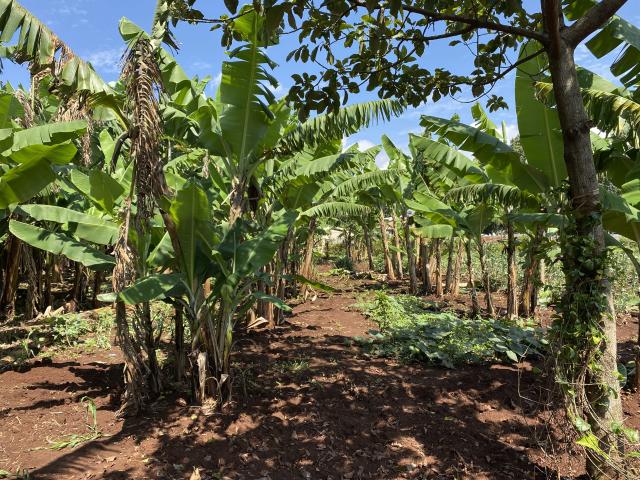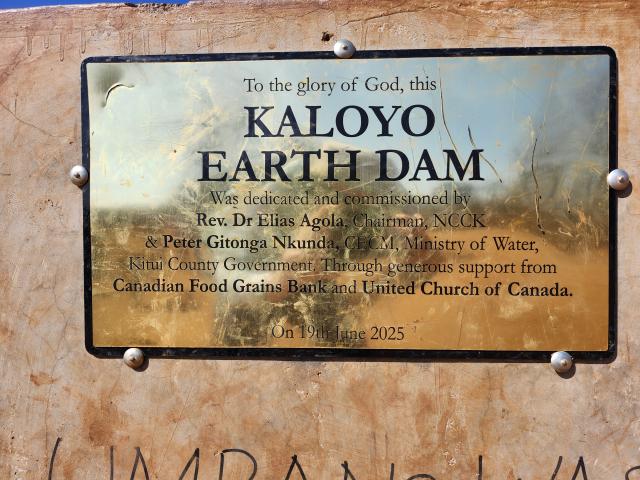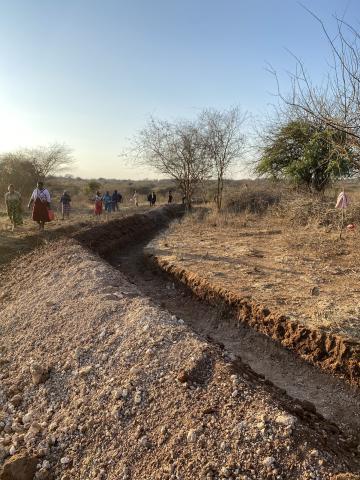A visit to United Church Global Partners empowering women and youth leaders in Kenya left Rev. Christopher Fraser deeply inspired

Recently, I had the opportunity of traveling to Kenya with the United Church of Canada’s Global Partnership Program. We called it a pilgrimage of learning—and that’s exactly what it became. From the energy of Nairobi to the rural communities, each place we visited seemed alive with faith, hope, and the transformative power of God’s work in community. I went as a learner, and I came home deeply changed.
Nairobi is alive with movement: painted minibuses darting through traffic, market stalls overflowing with goods, and the constant buzz of a growing city. In the middle of this vibrancy, we met with church partners and organizations who shared about their work.
One theme rose to the surface again and again: the importance of youth mentorship. Leaders told us that investing in young people—especially girls—is the key to ending cycles of violence and despair. I thought immediately of Jesus’ words: “Let the little children come to me, and do not hinder them, for the kingdom of heaven belongs to such as these” (Matthew 19:14). When children are given psychological support, safe spaces, and caring mentors, they don’t just survive—they flourish.
One of the most moving visits was to the Vihiga Livelihoods Project. This group has been an initiative supported by the Organization of African Instituted Churches (OAIC), a longtime partner of our church. One of the most moving visits was to the Jethidi Women’s Group. We gathered in their fields, the sun hot overhead, as the women proudly showed us their crops. They weren’t just feeding their families, they were teaching other women how to do the same.
Their commitment to providing for their households and lifting up others brought to mind Ruth, gleaning in the fields to sustain herself and Naomi (Ruth 2). What started as humble labor became a source of blessing for an entire family—and eventually for a whole community. In the same way, these women are planting seeds of hope that extend far beyond their own lives.
One of them told us, “What we learn, we share.” That simple phrase carried so much power. Like the mustard seed Jesus spoke of in Mark 4:30–32, their small beginnings had grown into something large enough to give shelter and life to many.
Their story reminded me that God’s abundance doesn’t stop with us. It flows through us, multiplying as we pass it on.
From Nairobi we traveled to Kitui, where the landscape is dry and rugged. Here, the National Council of Churches of Kenya (NCCK) is carrying out its Nature+ program in partnership with the Canadian Foodgrains Bank. Farmers are taught conservation techniques: terracing hillsides to hold soil, digging trenches to capture rainfall, building earth dams for water storage, and providing churches with tanks to collect rainwater.

We stood at one of these United Church-supported earth dams with everyone from the community. A villager explained that before the dam, children walked hours every day just to fetch water. We learned that just a week before our visit, a young girl from a neighbouring village had been killed by a crocodile while collecting water. We saw how something as simple as access to water can transform a community. Children are freed to attend school rather than trek long distances, and families able to cultivate their fields with better harvests. Life has changed.

As we drew water from the dam, I couldn’t help but think of Jesus at the well, offering the Samaritan woman living water. Water has always been a sign of God’s mercy and provision. Isaiah’s promise came to mind: “With joy you will draw water from the wells of salvation” (Isaiah 12:3). In Kitui, that promise felt tangible.
Everywhere we went, the future of young people came into focus. In Nairobi’s informal settlements we heard about mentorship programs for girls who are overcoming trauma. In Kitui, we saw youth being taught not just farming techniques, but also leadership and resilience.
Paul once told Timothy, “Don’t let anyone look down on you because you are young, but set an example for the believers” (1 Timothy 4:12). That verse echoed in my heart as I listened to the stories of young people finding their voice. When children are mentored, healed, and encouraged, they don’t just follow—they lead.
As our pilgrimage came to an end, I realized how vital global partnerships are. These are not relationships of giver and receiver; they are relationships of trust and mutuality.
The women farmers, the youth mentors, the conservation leaders—all of them reminded me of Paul’s vision of the body of Christ: “If one part suffers, every part suffers with it; if one part is honored, every part rejoices with it” (1 Corinthians 12:26). Our lives are knit together across oceans, and when we walk together, the whole body is strengthened.
I returned home humbled by the creativity and resilience of partners in Kenya and inspired by the Spirit at work in their midst. The seeds of hope we witnessed—in farms, in classrooms, at water dams—are seeds that will continue to grow.
Global partnerships like these matter because they reflect how Jesus works: through mutuality, trust, and love. As long as we keep walking together, I believe those seeds will bear fruit for generations to come.
—Rev. Christopher Fraser pastors in the United Church in Toronto, where he keeps finding that Jesus shows up in the most ordinary places.
The views contained within these blogs are personal and do not necessarily reflect those of The United Church of Canada.